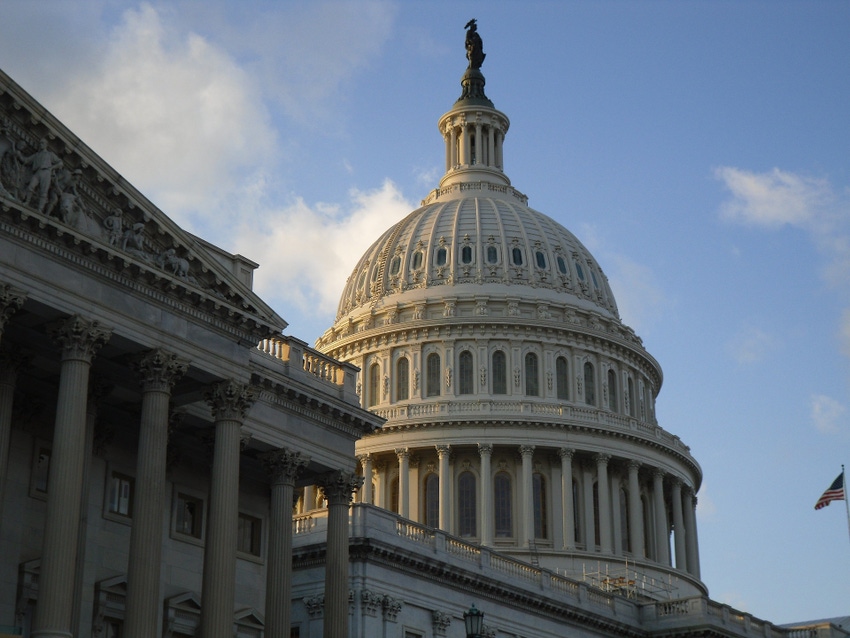Trump signs COVID package avoiding shutdown
Legislative Watch: Trump to submit a list of rescissions; USDA and HHS publish Dietary Guidelines; Congressional challenge to Biden election.

After objecting and threatening to veto the omnibus $1.4 trillion FY ’21 appropriations, which includes the $900 billion coronavirus stimulus package, President Trump signed the 5,593-page bill last Sunday. By signing the bill, a government shutdown was avoided.
The legislation expands programs for small businesses and provides additional support for nutrition, agriculture, schools, airlines, rail and transit systems and vaccine distribution. The bill gives unemployed Americans an additional $300 in supplemental benefits compared to the $600 per week under the CARES Act. It extends until the end of January 2021 a federal eviction prohibition and provides $25 billion of assistance to tenants in arrears on their rent.
Trump still wants Congress to increase the stimulus payments to individuals from $600 to $2,000. The House passed legislation to raise the payments on Monday. Senate Majority Leader Mitch McConnell (R-KY) said the legislation to raise the stimulus payments to $2,000 has “no realistic path to quickly pass the Senate.” This effectively ends the House-passed bill, with the 116th Congress adjourning at midnight on January 2.
Trump will be submitting to Congress a list of rescissions for consideration calling the items “wasteful spending.” Trump will use the Impoundment Control Act of 1974, which allows him to send a proposal to Congress to rescind certain funds. This will freeze those funds for 45 days. If Congress fails to act on the requests, the funds are then released.
Many of the items Trump will be asking Congress to rescind were proposed in his FY ’21 budget. Congress is expected to reject his requests.
Make every bite count
USDA and the Department of Health and Human Services (HHS) published the “Dietary Guidelines for Americans, 2020-2025,” with the theme “Make every bite count.”
The report found that nearly three-quarters of Americans meet or exceed the recommendations for meats, poultry and eggs. However, 90% fail to meet the recommendations for seafood and over half do not meet the recommendations for nuts, seeds, and soy products.
It recommends the public replace high-fat meat or processed meats such as hot dogs, sausages and bacon with seafood. This would help lower the intake of saturated fats and sodium.
The four main guidelines throughout the document are:
Following a healthy dietary pattern at every life stage.
Customizing and enjoying nutrient-dense food and beverage choices to reflect personal preferences, cultural traditions, and budgetary considerations.
Focusing on meeting food group needs with nutrient-dense foods and beverages from five food groups – vegetables, fruits, grains, dairy and fortified soy alternatives and proteins – and staying within calorie limits.
Limiting foods and beverages higher in added sugars, saturated fat, and sodium, and limiting alcoholic beverages.
The new guidelines are similar to the previous dietary guidelines. They do not include the Dietary Guidelines Advisory Committee’s recommendations to reduce the consumption of added sugars and alcohol. The committee recommended reducing the intake of added sugars from 10% to 6% and recommended men reduce their alcohol consumption from two drinks per day to one.
The dietary guidelines are updated every five years. They are used to provide recommendations to encourage healthy dietary patterns and for school meals.
Congressional challenge to Biden election
Next week on January 6, the House and Senate will meet in a joint session of Congress to validate the Presidential election. Vice President Pence will preside over the session by opening the state certificates and announce the electoral college results.
Congressman Mo Brooks (R-AL) and Senator Josh Hawley (R-MO) will contest the certification of various states that President-elect Joe Biden won. With a challenge in both chambers, the House and Senate will then meet separately and vote on the challenges.
The challenge will fail because the Democrats control the House and the Senate Republican leadership has urged its members to not support this effort.
This will be the third time Congress has had to debate a challenge since 1887.
Source: P. Scott Shearer, who is solely responsible for the information provided, and wholly owns the information. Informa Business Media and all its subsidiaries are not responsible for any of the content contained in this information asset. The opinions of this writer are not necessarily those of Farm Progress/Informa.
About the Author(s)
You May Also Like



